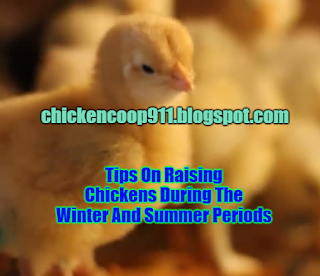Chickens may look fragile, but they can survive the elements, and weather almost any weather. If only all chickens were the same. Here are tips on raising chicken come hot or cold.
Though some could take the winter cold, others love the summer sun. It really depends on the kind of weather you have where you live, and on your choice of what kind of chicken to buy. You don't want to buy chicken you plan to raise, only to see them perish under the weather.
But if where you live winder is dominant than the sunny seasons, you may as well take precautions, else your chickens may not survive the cold that long.
When heat waves come, your chickens lay fewer eggs. When this happens, that's a sign your chickens feel stressed because of the heat. Once the heat goes down, they will lay eggs as they normally do.
When things go bad, you'd have to watch your chickens' closely. Did one catch a cold, is another acting odd? You'd have to isolate that one chicken with some symptoms, else you'd let the disease fan out and spread. Raising chickens isn't easy. You'd have to keep an eye open, but it can be done.
You'd also have to contact your vet, and inform him how your chickens are acting, or reaction. Inform your vet if your chickens have:
Source: links2raisingchickens.com/how-to-start-raising-chickens.php
Though some could take the winter cold, others love the summer sun. It really depends on the kind of weather you have where you live, and on your choice of what kind of chicken to buy. You don't want to buy chicken you plan to raise, only to see them perish under the weather.
Raising Chickens Come Winters
When winder or cold weather comes, avoid the impulse to warm up your chickens just because you don't want them to freeze, or catch a cold. If you do, you'd probably see them stiff and warm and dead by sunrise. Just so you know, chickens can adapt to extremely cold weather. This is because their bodies' metabolism changes as the cold season comes.But if where you live winder is dominant than the sunny seasons, you may as well take precautions, else your chickens may not survive the cold that long.
- The wattle and comb of chickens could suffer frostbite; so, every other day, rub some petroleum jelly or a moisturizer on them.
- Watch their water supply. Water can freeze during winters and you'd be leaving them without any source of water. Don't let your chicken consume water with impurities; always let them drink from clean and fresh water. One way to let the water stay liquid is to bring out the water heater. Another is to bring the waterer inside your house, afterwards, bring it back come morning.
Raising Chickens Come Summer
If you live in an area where it's hot most of the year, then you chickens are vulnerable to high heat and its dangers. Like dehydration. So it's natural to watch it so they don't run out of water, that they always have access to some, and clean water at that. You also must provide a structure where you chickens can get some shade.When heat waves come, your chickens lay fewer eggs. When this happens, that's a sign your chickens feel stressed because of the heat. Once the heat goes down, they will lay eggs as they normally do.
When things go bad, you'd have to watch your chickens' closely. Did one catch a cold, is another acting odd? You'd have to isolate that one chicken with some symptoms, else you'd let the disease fan out and spread. Raising chickens isn't easy. You'd have to keep an eye open, but it can be done.
You'd also have to contact your vet, and inform him how your chickens are acting, or reaction. Inform your vet if your chickens have:
- mites;
- sneezing & teary eyes;
- unable to mingle with the rest of the flock;
- lost appetite;
- blood or worms in their droppings, or if they droppings are white.
Source: links2raisingchickens.com/how-to-start-raising-chickens.php






0 Comments:
Post a Comment